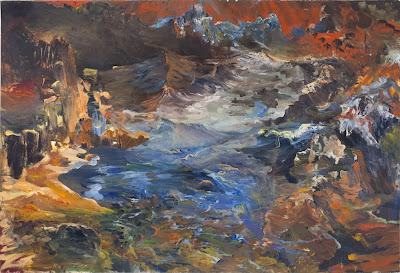
I saw on your resume that you studied Geography-- and I can see that interest in your paintings. Can you talk a little bit about subject matter- and how you arrived at the subject of your work.
My interest in landscape is probably linked to family background. Both sides of my family were farmers for many generations, but, in response to post-WWII economic changes, migrated to urban centers during my childhood. I think what I inherited from this is an intense awareness of the physical environment, as well as a need to address the condition of fragmentation and loss that seems to accompany upheaval and change.
My initial interest in studying geography as an undergraduate stemmed from a need to avoid taking Chem 1A, a course that stood between me and any serious study of geology, physics and botany, all of which I found fascinating, at least in theory. But as it turned out, studying geography gave me exactly what I needed - a broad overview of the various forces that interact to create a landscape.
A few years after I began painting, landscapes seemed to emerge on their own accord from randomly applied fields of color, but my fractured sense of place kept them from resolving into a single environment. Eventually, I realized that what I was trying to do was to make several different environments, conflicting views and the passage of time into a single unified landscape.

What artists, books, or other sources do you look to for ideas and inspiration?
Art that most inspires me is probably outsider art, as it comes from such an intense need. But I look at all sorts of painters for inspiration. Lately it's been Robert Colescott, who died last year. I love his compositions and kind of brutal sense of humor.
I also like to read geology- and physics-for-dummies type of books for ideas and inspiration, as they help in trying to grasp the fundamental principles that govern space, time and the physical environment. And I love looking at maps and satellite imagery.
Painting at residency programs has also been a great source of inspiration; the experience of unfamiliar environments converging on my senses seems to shake up old habits and open up new possibilities.
Did you always want to be an artist? and how did your career develop when you were first starting out?
It did not occur to me to make art until my early 30s, when a friend encouraged me to join her weekly drawing group. Something clicked during my first session, and from that point on, art became the organizing principle of my life. My career has unfolded more or less in step with the development of my work. As the work has gotten better, more opportunities have come up.

What is the most interesting and engaging part about making your work?
The seemingly simple act of moving paint around a surface can be completely engaging. It shows me that the conscious mind is just a fraction of a much larger thing that we can’t even begin to comprehend. I need that, because I tend to feel trapped by the demands of day-to-day life, and bored with a lot of what passes for entertainment and pleasure. Painting releases me from that; it has a mind of its own, its own ideas about what it wants to do.
What do you least enjoy about making your work--but you've gotta do it?
What can I say - oil paint is messy. I'm messy. Cleaning is essential.
What is your studio routine?
I try to draw every day to clear my mind. The drawings often reflect the sort of day I'm having - the background noise of day-to-day life and its minor irritations. Then I try to read something about landscapes - right now it's John McPhee’s Annals of the Former World – and after that, I'm usually ready to paint.

What are you working on now?
I’m working on paintings inspired by my interest in plate tectonics. The theory goes something like this: the Earth’s crust is broken up into a series of interlocking plates. The plates are themselves set in motion by the continual upwelling of molten material from the Earth’s core, as well as the gravitational pull exerted by the moon. Inevitably, these fragments collide and grind against each other, or tear apart and separate. There is something about this theory that resonates symbolically with my life experience as well as the prevailing cultural and political climate, and continues to shape my work.
What do you enjoy doing when you're not in the studio?
As a painter of landscape, I feel like I should be a dedicated hiker and/or plein air painter. Alas, I’m not. I do like to walk, though, to nowhere in particular. I just enjoy moving through space and time, looking at things.
What philosophy or words do you live by?
My philosophy resembles the theory of plate tectonics. The human condition mirrors that of the Earth’s crust — fragmented and constantly in motion, driven by forces beyond our control. Cheerful, huh? I’ve managed to extract a small amount of wisdom from the Buddhists that brings me peace of mind. Detachment. Acceptance. Meditation. Breathe.

Dorothy Robinson’s paintings have been featured in solo and group exhibitions in museums and galleries, including the Berkeley Art Museum, Williamsburg's Slate Gallery and at Edward Thorp Gallery in Chelsea. She has a studio at the Elizabeth Foundation for the Arts in New York City, and received a Pollock Krasner award in 2008. To learn more about Dorothy, please visit her website.